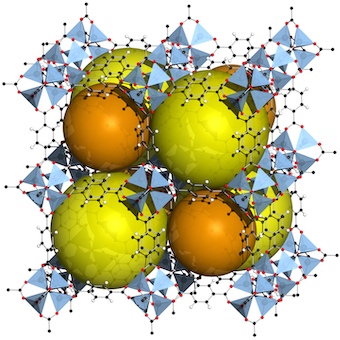The notion of metal-organic frameworks conjures up visions of cybernetic organisms self-described as “living tissue over a metal endoskeleton” from a certain well known science fiction franchise. But there’s nothing fictitious about this astounding field of materials science. For Professor Ed Lester from the University of Nottingham, the carbon transition has delivered renewed interest in Promethean Particles, the university research and development spinoff he founded way back in 2007.
Metal-organic frameworks (MOF) are a class of porous polymers consisting of secondary metal ion clusters linking to organic ligands and forming structures of one, two or three-dimensional structures. Organic ligands are molecules containing carbon that bind to metal ions to form coordination complexes. Common examples include carbon monoxide, acetylacetonate and pyridine. Coordination complexes play an important role in biochemistry, catalysis, and materials science. Interestingly, organic metal-binding ligands are involved in the bio-availability of trace metals in marine environments. An intriguing illustration of ligand dexterity across a range of applications.
But perhaps two of the most interesting and useful qualities of metal-organic frameworks are high porosity and large surface area. These qualities make the compounds highly useful for a number of industrial applications such as gas storage, water purification, atmospheric water extraction and carbon capture. The use of MOFs in advanced battery development has also been explored. All of which makes the field an exciting area for regenerative science. However, despite the potential opportunities, several challenges need to be addressed before industrial adoption becomes widespread.
Reducing production costs, scaling up processes and selecting appropriate and stable MOF candidates will be critical to these compounds having a commercial future. In the past, production runs have been measured in grams, but the market demand may eventually be in the order of tens of thousands of tonnes. This is the realm in which Professor Lester dwells with Promethean Particles. Described as a “paradigmatic shift”, the company provides technologies that allow producers of MOFs to scale to an industrial level. Once this is achieved, MOFs will find their way into large CO2 scrubber systems that can be installed at the source and possibly also hydrogen gas storage systems for alternative energy networks. Important weapons in the battle against greenhouse gas emissions.
Backed by UK angel investors and the University of Nottingham, Promethean Particles is a case study in patient capital. But with a solid track record of publicly funded research delivery, exploding demand for nano-materials to aid the carbon transition and a recently closed £8 million Series A funding round involving Mercia and Aramco Ventures, the future looks rosy.
Image credit: Tony Boehle via Wikimedia Commons CC BY-SA 3.0
Genius ReFi brings together Researchers, Entrepreneurs, Investors and Industry for creative collaborations in the commercialization of scalable Regenerative Science.





